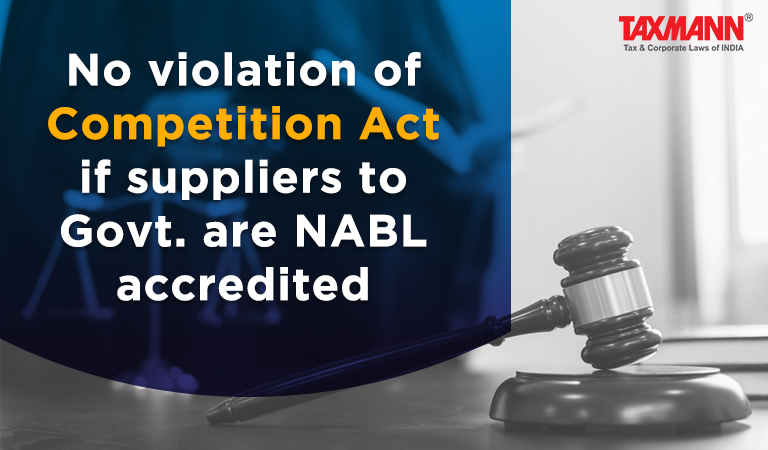No violation of Competition Act if suppliers to Govt. are NABL accredited
- Blog|News|Competition Law|
- 2 Min Read
- By Taxmann
- |
- Last Updated on 28 February, 2022

Case Details: Mr. Dushyant v. National Accreditation Board for Testing and Calibration Laboratories (NABL) & others [2022] 135 taxmann.com 349 (CCI)
Judiciary and Counsel Details
-
- Ashok Kumar Gupta, Chairperson
- Sangeeta Verma and Bhagwant Singh Bishnoi, Member
Facts of the Case
In the instant case, Mr. Dushyant (“Informant”) filed an application under section 19(1)(a) of the Competition Act, 2002 (Act) alleging contravention of the provisions of Sections 3 and 4 of the Act by the National Accreditation Board for Testing and Calibration Laboratories (“NABL”) and other Department of Government/ Government-affiliated bodies or Public Sector Undertakings (OPs).
The informant alleged that NABL entered into Exclusive Supply Agreements (ESA) with the other OPs where no other accreditation service other than that of NABL was allowed. The suggested bidders/ suppliers had to obtain accreditation services from NABL and its accredited laboratories only.
The informant contended that when there were other accreditation agencies existing as on date in India. The informant alleged that it violated the provisions of section 3 (4) of the Act.
The informant further submitted that it lead to the monopolisation of power in the hands of NABL and caused an appreciable adverse effect on competition and led to the denial of market access also. The informant contended that this is in violation of Sections 4(2)(a) and 4(2)(c) of the Act.
CCI Held
The Commission held that the informant failed to provide any evidence about NABL having an agreement/ arrangement with OPs in relation to some exclusive arrangement in favour of NABL. Thus, the Commission, prima facie, does not find a contravention of Section 3(4) of the Act by any of the OPs.
As far as the question of violation of section 4 of the Act was concerned commission held that the Informant failed to provide any data/ information to support his claim in respect of market share or dominance of each of the OPs.
The OPs seeking NABL’s accreditation (based on their policies/ guidelines/ rules of procurement/ some enactments governing their functioning), there was nothing to suggest that NABL had any role in framing the same.
Further OPs are free to stipulate standards for procurement, and the same cannot be held to be out-rightly anti-competitive. There was no hint to suggest that procurers other than OPs are also imposing similar conditions as the present OPs. Therefore the question of foreclosure of the market for other accreditation agencies doesn’t arise.
The Commission ordered that there was no prima facie case of contravention of any of the provisions of Section 3 and/or 4 of the Act was made out against the OPs for causing an investigation into the matter, and therefore, the matter was ordered to be closed forthwith.
Disclaimer: The content/information published on the website is only for general information of the user and shall not be construed as legal advice. While the Taxmann has exercised reasonable efforts to ensure the veracity of information/content published, Taxmann shall be under no liability in any manner whatsoever for incorrect information, if any.

Taxmann Publications has a dedicated in-house Research & Editorial Team. This team consists of a team of Chartered Accountants, Company Secretaries, and Lawyers. This team works under the guidance and supervision of editor-in-chief Mr Rakesh Bhargava.
The Research and Editorial Team is responsible for developing reliable and accurate content for the readers. The team follows the six-sigma approach to achieve the benchmark of zero error in its publications and research platforms. The team ensures that the following publication guidelines are thoroughly followed while developing the content:
- The statutory material is obtained only from the authorized and reliable sources
- All the latest developments in the judicial and legislative fields are covered
- Prepare the analytical write-ups on current, controversial, and important issues to help the readers to understand the concept and its implications
- Every content published by Taxmann is complete, accurate and lucid
- All evidence-based statements are supported with proper reference to Section, Circular No., Notification No. or citations
- The golden rules of grammar, style and consistency are thoroughly followed
- Font and size that’s easy to read and remain consistent across all imprint and digital publications are applied



 CA | CS | CMA
CA | CS | CMA
